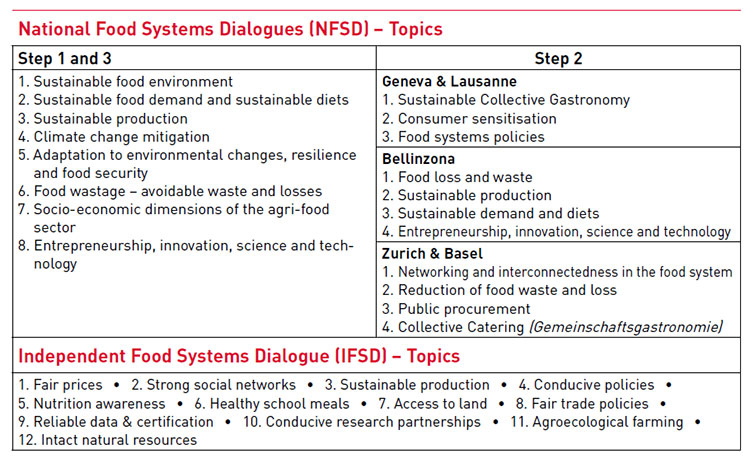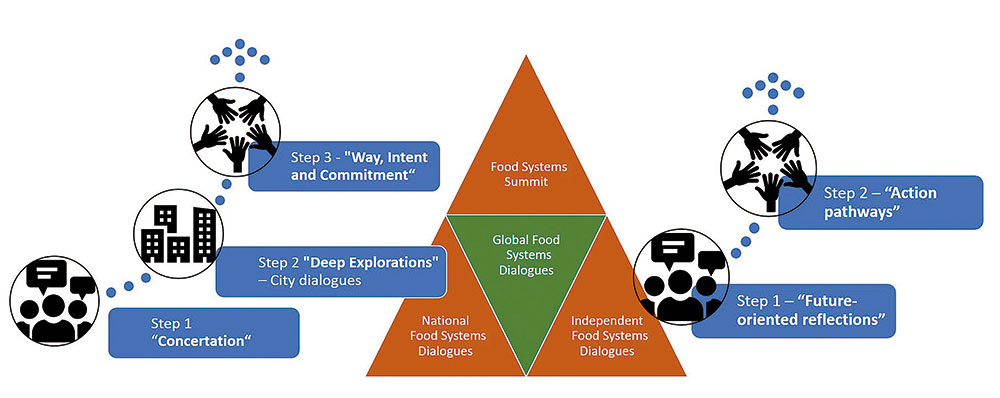 Download this article in magazine layout
Download this article in magazine layout
- Share this article
- Subscribe to our newsletter
The future of Rösti and Fondue – Switzerland’s contribution to the food systems dialogues
In 2020, UN Secretary-General António Guterres alerted in his policy brief on the impact of COVID-19 on food and nutrition security that the number of people categorised as being in a food crisis could nearly double before the end of the year. It appears that most likely, Sustainable Development Goal (SDG) 2 – Zero Hunger – will be missed. These are signs of a system in deep crisis and in very urgent need of change. The question is not anymore if but how we have to strengthen our food systems. What are key actions and powerful ways to make food systems stronger and more equitable? This crucial question was put forward to individuals, groups, societies, nations and institutions in the framework of the food systems dialogues conducted in preparation for the UN Food Systems Summit. This article documents key insights of selected food systems dialogues in Switzerland. It focuses on experiences gathered from the National Food Systems Dialogue, curated by the Swiss Federal Office for Agriculture (FOAG) together with Helvetas, and an Independent Food Systems Dialogue curated by the Swiss Agency for Development and Cooperation (SDC). Both dialogues were conducted online between March and June 2021.
Why food systems in Switzerland need to be strengthened – and global food linkages matter
The discussions taking place during the food systems dialogues addressed key characteristics and challenges of Swiss food systems. According to official statistics, 85 per cent of the consumers either live in cities or in urban environments close to major cities. More than 90 per cent of all consumers source their food from supermarkets and discounters where local and regional food labels feature prominently. However, particularly in contrast to price levels in neighbouring countries, high food price levels fuel the phenomena of consumer tourism, especially in border regions.
Food waste is a problem. About one third of the food in Switzerland is either wasted or lost and represents the production potential of half of Switzerland’s agricultural surface. Self-sufficiency in food production is 55 to 60 per cent, hence food imports make a significant contribution to national, regional and local food systems. Food trends such as the increased consumption of out-of-season products (sourced from southern Europe), tropical fruits and lifestyle foods like quinoa, avocado and others, contribute to food imports. The Swiss average diet is composed of too much sugar, salt, meat and insufficient amounts of vegetable and fruits, and is considered unhealthy. One third of the population consume a special diet, and a significant share complement their diet with dietary supplements. There is a negative trend concerning key nutrition outcomes. In recent years, an increase in the incidence of overweight, obesity, diabetes and anaemia among adolescents and adults has been observed.
Setting the scene
The National Food Systems Dialogue was designed as a three-step process with national consultations for step 1 and step 3 and City Food Systems Dialogues (CFSDs) for step 2 (see Table below). Three CFSDs were co-curated by Helvetas in three linguistic regions of Switzerland: Geneva & Lausanne (French), Bellinzona (Italian) and Zurich & Basel (German). Each of the five meetings lasted 3-4 hours. Overall, more than 300 people participated in them. Everyone could apply for step 1 (see also Box), although not every application was approved. Shortlisted participants were invited to step 2, while participants from step 1 and selected participants from step 2 were invited to step 3.
Food Systems Summit Dialogues
To prepare the United Nations Food Systems Summit, the UN recommended to all its members and interested stakeholders to conduct Food Systems Summit Dialogues. The Dialogues are organised along five action tracks:
1) Ensure access to safe and nutritious food for all;
2) Shift to sustainable consumption patterns;
3) Boost nature-positive production;
4) Advance equitable livelihoods;
5) Build resilience to vulnerabilities, shocks and stress.
The UN methodology foresees multi-step multi-stakeholder dialogues with representation from all food system stakeholder groups. Stakeholders were encouraged to organise independent, national or global dialogues. In the case of the Swiss NFSD, the multi-stakeholder Steering Committee recommended important representatives from the public and private sectors and civil society. However, the Federal Office for Agriculture also considered spontaneous requests from private individuals as long as these fulfilled the criteria for a balanced representation of interests.
SDC’s Independent Food Systems Dialogue was designed as a two-round process and had representation from across the globe. The dialogue was conducted in three languages. Round 1 focused on engaging participants topically and round 2 on defining pathways for action which will serve as a blueprint to be adapted by relevant stakeholders in the future, taking into consideration the particular local, regional and national context. In the six meetings, 290 participants discussed twelve vision statements along twelve topics (see Table). For instance, concerning access to land, participants were asked to respond to the following statement and suggest concrete action: “Land and judicial reforms allow improved and equitable access to land and justice for all, explicitly also for women and youth, securing what farmers invested in the land and the sustainable and resilient development of decent livelihoods and economic independence.”

Both dialogues were framed by the five action tracks defined by the UNFSS (see Box above). Furthermore, the National Dialogue took into consideration the four strategic pathways for food system transformation as proposed in Switzerland’s Strategy for Sustainable Development 2030 (SSD), which focus on improving nutrition, strengthening sustainable production and reducing both food loss and waste and greenhouse gas emissions.
Key insights from the National Food Systems Dialogue
Participants agreed on the need for an overall strategy and policy coherence on food systems which includes the agriculture, nutrition, environment and public health sectors. Furthermore, in order to foster exchange and collaboration, a regular dialogue with a systemic approach at national level including all stakeholders along the value chains and the whole society was demanded. Participants highlighted individual responsibility as a key element of food systems transformation. Individual responsibility refers to values, norms and action affecting nutrition outcomes as well as other outcomes. Individual responsibility should be based on an informed decision, and consumers should consider the consequences of their food-related actions for themselves, society and the environment. Information sharing, awareness raising and education are therefore key elements and should be promoted. However, participants agreed that these efforts need to be complemented with structural measures. Such measures mentioned included incentives, minimum/maximum requirements and bans. For instance, banning unsustainable items from supermarket shelves was suggested. Participants argued strongly for a need to change the paradigm by considering the value/ quality of food holistically. Increased transparency and the setting of the true cost of food were mentioned as possible means to achieve this.
Various issues were discussed controversially. For instance, there was some disagreement on the effectiveness of standards and labelling. On the one hand, comprehensive labelling was seen as a useful tool for consumers to make an informed decision. On the other hand, it was argued that consumers were overwhelmed by assessing compliance with labels and standards. Furthermore, there was divergence on the question of what elements and/ or activities of the value chains have the bigger leverage effect in making our food systems more sustainable. Whereas some participants found that reducing the gap between consumers and farmers was most crucial, others stated that the “large” market was still the driving force in our food systems and could in turn be less influenced by consumers.
Zooming in on cities
Cities are important hubs of innovation and play a crucial role in strengthening food systems. City governments are well positioned to hold close relationships to partners, to guide and facilitate their collaboration and to implement context-specific solutions. It was claimed that cities should enhance their support to food systems innovations at various levels. Firstly, cities can lower entry barriers for initiatives and start-ups, for example by provision of unbureaucratic funding mechanisms (e.g. competitive grants), infrastructure (buildings, land) or by facilitating legal processes. Secondly, cities are important market players: each year, they purchase food through public procurement processes, food that is consumed in schools, hospitals and canteens. By orienting the procurement standards coherently along sustainability criteria, cities have a big leverage both in the market (demand), vis-à-vis professionals (cooks, caterers) and consumers. It was claimed in particular that price should be given less weight in submissions compared to sustainability criteria.
Thirdly, cities should foster an interdisciplinary approach to food systems between the traditional “thematic silos” of environment, health, education etc. Comprehensive strategies such as Zurich’s Strategy on Sustainable Nutrition form a useful base for such efforts. Further, cities play a vital role in building a high level of interconnectedness between stakeholders, creating spaces of exchange and making the topic visible for broad sensitisation. Fourthly, building functioning city region food systems is of vital interest to cities and local stakeholders. Therein, regionalisation is considered a means towards resilience and sustainability. Approaches include direct market linkages between (peri-)urban farmers and consumers, short value chains and local manufacturing, and enhanced emotional relationship of consumers to the origins of local food. Finally, systematic communication on the topic of sustainable food is found to be essential to induce change. Public institutions, businesses, research partners and civil society organisations all need to play their part in sensitising people towards core topics such as food waste reduction, healthy meal preparation and reducing the ecological footprint.
Key insights from the Independent Food Systems Dialogue
In summary, participants identified three core needs. Firstly, the establishment of strong inclusive, facilitated dialogue platforms (digital and in-person) by the international community to close knowledge gaps, to co-produce knowledge especially related to agroecology & nature-positive production and to appropriately operationalise agricultural data for planners, producers and consumers. Secondly, the need to raise consumer awareness on food and to strengthen positive practices e.g. through behaviour change and awareness raising campaigns in the public, in schools and for women’s and youth groups, but also through packaging and labelling standards. This will contribute to the strengthening of short value chains and thereby reduce market gaps between producers and consumers. Thirdly, the need to develop enabling policies and to foster conducive environments to deliver progress on all 17 Sustainable Development Goals (SDGs), i.e. to regulate fair, secure, safe access to data, to incentivise lower emissions and agro-ecologic production and related investments and the inclusion and formalisation of smaller producers.
Challenges and best practices
Experience gained in the dialogues has shown that in order to achieve tangible and feasible results in food systems dialogues, it is helpful to refer to a local/ regional context. During the CFSDs, the concerned city administrations collaborated closely with Helvetas in organising the events. Therefore, cities had strong ownership throughout the dialogues, and discussion topics could build on context-specific initiatives and real-case situations. This helped in elaborating realistic solutions which are anchored in existing and active networks. However, the virtual nature of the dialogues was a major challenge. Because of that, the dialogues developed less momentum compared to a face-to-face event, though. On the other hand, the independent dialogue with a large international participation benefited from the virtual venue and was feasible thanks to its cost effectiveness.
Mobilising larger systems actors such as big food retailers, industries or traders proved difficult for the city and national dialogues. While large retailers are important actors and beneficiaries of cities food systems, their presence and interest in the dialogues were below expectations. Multi-stakeholder food system platforms with cities in a convenor role are seen as an important step forward to accelerate the transformation of Swiss food systems.
What’s next?
The reports of Switzerland’s national and independent dialogues are accessible on the virtual platforms operated by the UNFSS Secretariat. The UN will provide a synthesis report of all dialogues held worldwide to the UNFSS in September which aims at advancing the global discussion and actions on food systems transformation. Furthermore, the dialogues will help countries to define pathways for their respective food system transformation. The outcomes of the Swiss dialogues inform the Swiss delegation to the UNFSS. Additionally, dialogue outcomes will be instrumental in working along the four strategic pathways defined by the Strategy for Sustainable Development (SSD) on food system transformation in Switzerland.
The UNFSS dialogues in Switzerland created more appetite for dialogues on deepening food systems discussions and actions by a broader spectrum of actors and organisations. Also, the Swiss government identified the need to embed dialogues in its SSD 2030 Action Plan. In other words, institutionalised and more regular dialogues, conducted at different levels of the society, will accelerate food systems transformation and related policy formulation.
David Bexte and Raphael Dischl are Advisors at HELVETAS Swiss Intercooperation at Zurich, Switzerland.
Alwin Kopse is Head International Affairs and Food Security at Swiss Federal Office for Agriculture in Bern.
Ueli Mauderli is deputy head of the Bolivia programme of the Swiss Agency for Development and Cooperation (SDC). Until June 2021 he was Focal Point for SDC’s Agriculture and Food Security Network.
Contact: David.Bexte@helvetas.org
Further reading:
National food system dialogues
- Step 1: https://summitdialogues.org/dialogue/5003/
- Step 2 Zurich/Basel: https://summitdialogues.org/dialogue/13517/
- Step 2 Geneve/Lausanne: https://summitdialogues.org/dialogue/13513/
- Step 2 Bellinzona: https://summitdialogues.org/dialogue/13515/
- Step 3: https://summitdialogues.org/dialogue/13519/
SDC independent food system dialogues
2023 Sustainable Development Strategy





Add a comment
Be the First to Comment